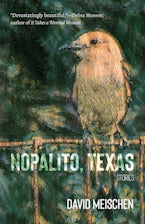Cabañuelas
A Novel
Published by: University of New Mexico Press
304 Pages, 5.50 x 8.50 in, 45 halftones, 1 map
Finalist for the 2020 Jesse H. Jones Award for Best Work of Fiction
Nena leaves Laredo, Texas, and moves to Madrid, Spain, to research the historical roots of traditional fiestas in Laredo. Immersing herself in post-Franco Spain and its rich history, its food, music, and fiestas, Nena finds herself falling for Paco, a Spaniard who works in publishing. Nena's research and experiences teach her about who she is, where she comes from, and what is important to her, but as her work comes to a close, Nena must decide where she can best be true to her entire self: in Spain with Paco or in Laredo, her home, where her job and family await her return.
Norma Elia Cantú is the Norine R. and T. Frank Murchison Distinguished Professor of the Humanities at Trinity University. Her recent works include Transcendental Train Yard: A Collaborative Suite of Serigraphs, Canícula: Snapshots of a Girlhood en la Frontera, Updated Edition (UNM Press), and the coedited anthology Entre Guadalupe y Malinche: Tejanas in Literature and Art.
"Readers will . . . learn much about the human heart along the way."--Michele Potter, enchantment
"The borderlands are integral to Nena, to her experiences, and to her writing, and Cabañuelas is a testament to this."--Ana Roncero-Bellido, Chiricú Journal: Latina/o Literatures, Arts, and Cultures
"Cantú writes the effortless prose of a travel writer or memoirist reporting contemporary events, a diarist. . . . Cantú controls her art with excellence."--La Bloga
"Cantú continues to be [a] major source for understanding life on the border."--Roundup Magazine
"Cabañuelas will renew interest in Cantú's previous work as well as earn her a new generation of fans."--NBC News
"As a folklorist, Cantú is fascinated by the hybrid culture that the border creates. Her novels often capture this dynamic world and what it means to grow up there."--Smithsonian Folklife
"We can't know where Cantú diverges from Nena in Cabañuelas. What we can know, what is lyrically evident in Cantú's latest novel, is her trust in commonalities and her love for both the people and the landscape of the borderlands."--Lone Star Literary Life
"It is a feast for the senses, sighing of monarch butterflies flocking south, croquetas de salmon and plato fuerte, Tejano music blaring against the stars. . . . Cabañuelas is an arresting story of individual complexities."--Foreword Reviews
"The pictures of Spain Cantú paints with her words are as rich as the Texas soil of her homeland. . . . Marvelously entertaining and romantic."--Texana Reads column, Corpus Christi Caller-Times
"This book is a brilliant meditation on the traditional fiestas of Spain and the years of La Movida. . . . This novel creates a new blueprint of representation that points at the fluidity of time and space, to a consciousness that refuses borders and the sort of separation that Cantú's writing is usually addressing."--Juan Velasco, American Book Review
"A personal almanac that crosses borders of genres, a testimonio/novela, a compendium of folklore, a collection of snapshots, an unlynching, a rope loosened from the throat of history, a telling, a woman reclaiming a private geography from that multiplicity of geographies--la frontera, from un 'pedacito de tierra that is home.'"--
Sandra Cisneros, author of The House on Mango Street
"In Cabañuelas, both author and protagonist are ethnographers, co-weaving a story rich in descriptions of folklore, architecture, landscape, relationships, and academia while telling a transtemporal and transcontinental story of self-affirmation against the historical backdrops and center-stage landscapes of Spain, Mexico, and the United States."--Larissa M. Mercado-López, coeditor of (Re)mapping the Latina/o Literary Landscape
Las Cabañuelas
¡Gracias!
Prologue
Part I. Época de desamor
Fiestas de enero
Reyes Magos
Roomies
Morning Ritual
Raros e incunables
Happy Birthday
El trajín
Febrero loco . . .
La Endiablada y Nuestra Señora de las Candelas in Almonacid
Santa Águeda in Zamarramala
Part II. La fuerza del destino
La fuerza del destino
Madrid, Madrid, Madrid . . .
Non, je ne regrette rien
. . . Marzo otro poco
Valencia's Falles y Ninots
El Retiro
Spring Fever
Chinese Test
Walking. Talking. Reading. Sewing.
Friday Ritual
Public Displays
Segovia
Asturias y Tejas
Maíz
Part III. Jugar con fuego
Board Games
Alcoy's Moros y cristianos
Washington Irving Cultural Center
Semana Santa in Cuenca
El día de la coneja
Immigrants
Caravaca de la Cruz
Cuentos
The Cruelest Month
Lhardy's
Biblioteca Nacional
Reminders of Home
Miercoles de tertulia
April in Paris
Recuerdos y lágrimas
Part IV. La Cruz de mayo
La Cruz de mayo
Sonny in Pamplona
Lumbier and the Holy Cross
The Power of Faith
María Izquierdo
Of Stars and Santa Teresa
Ávila
Atienza y la Caballada
Tomás and Maru
Erasure
Camuñas--Pecados y danzantes
Corpus Christi in Toledo
Books and Writing
Músicas
Of Gypsies and Orange Blossoms
Peña de la Platería
Regalitos
San Fermines--Running of the Bulls
Pilgrimage to Santiago
Adios in Madrid
Time to Go Home
Como golondrina
Homecoming
Part V. Epilogue
New Orleans, 1981
Madrid, 2000










